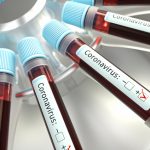NEW YORK (Reuters Health)—The ongoing novel coronavirus pandemic has raised concerns about whether biologic therapy could make psoriasis patients more susceptible to SARS-CoV-2, the virus behind COVID-19.
Mark Lebwohl, MD, from Icahn School of Medicine at Mount Sinai Hospital in New York and colleagues address this issue in a letter in the Journal of the American Academy of Dermatology.1
At this stage, specific data about susceptibility to the virus is lacking, but data on infectious complications for biologic therapies from pivotal trials for psoriasis can provide some guidance when deciding whether to continue biologic therapy during pandemics, they write.
The authors provide a comparison of overall infection rates, as well as upper respiratory infections (URTI) and nasopharyngitis, for different biologics relative to placebo based on the trial data.
With tumor necrosis factor (TNF) alpha blockers, for example, overall infections and URTI were increased by up to 7% compared with placebo, except for etanercept, which showed no increase.
With ustekinumab, which blocks interleukin (IL) 12 and IL-23, there was a small increase in overall infections but not in URTI. IL-23 blockers showed increases in overall infections up to 9%, but URTI were increased only slightly in some trials, but not at all in other trials.
IL-17 blockers showed increases in overall infections by up to 11%, but much of that increase could be accounted for by increases in monilial infections. URTIs were increased by only small amounts for secukinumab, but not for ixekizumab or brodalumab.
Dr. Lebwohl and colleagues acknowledge, “It is difficult to extrapolate from these data to susceptibility to coronavirus infection, and this analysis is further flawed by small numbers of infections and short placebo-controlled periods. Moreover, minor respiratory infections may be under-reported, and some infections may be reported doubly as upper respiratory infections and as nasopharyngitis.”
“Nonetheless, this data may be used to decide whether to continue biologic therapy during pandemics. We do not know if biologic therapies render patients more susceptible to coronavirus, but we know that in a pre-coronavirus era, respiratory infection rates were comparable to placebo. Conversely, discontinuation of some biologics can result in loss of response when treatments are reintroduced or even result in the formation of antibodies to the discontinued biologic. All of these factors must be considered when advising patients about continuing or discontinuing biologic therapies,” the authors conclude.
In a separate letter in the journal, Dr. Vivian Shi of the University of Arizona, Tucson, and colleagues review considerations for addressing patient concerns surrounding immunomodulator/immunosuppressant use in dermatology in the setting of COVID-19.2
“Currently there is no data describing the benefits or risks of stopping immunomodulators/immunosuppressants during the COVID-19 outbreak,” they point out. “However, each medication’s mechanism of action, administration method/frequency, and pharmacokinetics/pharmacodynamics are important to consider. Non-biologic medications including small molecule inhibitors and immunosuppressants are typically easier to stop and re-start within days to weeks due to shorter half-life,” they write.
They conclude, “Shared decision-making is needed when deciding on a treatment plan including immunomodulators/immunosuppressants during the COVID-19 outbreak. Patients with existing comorbidities may require more conservative measures. Physicians should continue to consult with the Centers for Disease Control and Prevention (CDC) Information for Healthcare Providers, which is updated daily.”
References
- Price KN, Frew JW, Hsiao JL, et al. COVID-19 and immunomodulator/immunosuppressant use in dermatology. J Am Acad Dermatol. 2020 Mar 26. [Epub ahead of print]
- Lebwohl M, Rivera-Oyola R, Murrell DF. Should biologics for psoriasis be interrupted in the era of COVID-19? J Am Acad Dermatol. 2020 Mar 18. [Epub ahead of print]


